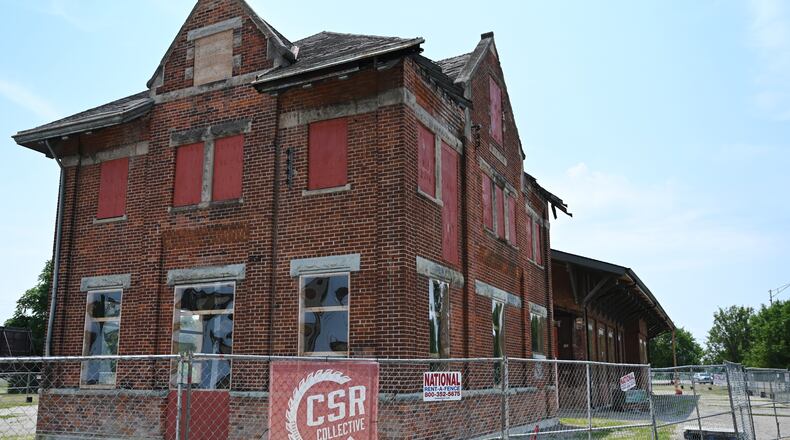The service is soliciting electronic comments on the significance of properties nominated. Comments must be submitted electronically by July 8.
Three years ago, Hamilton City Council voted to save the historic depot, which was built in the 19th century by the Cincinnati, Hamilton and Dayton Railroad. It was an important portal for the city’s business community as thousands used the rail before interstates and air travel became the norm for travel.
It also served as a gateway for the young men of Butler County who rode off to serve in the Civil War through the Korean Conflict, according to Mallory Greenham, Hamilton’s chief of staff.
In his letter of support to the Hamilton Community Foundation Mayor Pat Moeller wrote, “Quite simply, this place matters.”
He wrote the train station “brought our community happiness and cheering and brought our community sadness and tears.”
World War I soldiers left Hamilton from the train station to “face the unknown terrors of war and trench warfare” and while some soldiers came home to cheers, some soldiers came home to tears and to be laid to rest after becoming war fatalities, according to Moeller.
The train station also brought Hamilton philanthropists and skilled laborers from all parts of the country and from many parts of the world. They made Hamilton “a manufacturing leader of the world,” he wrote.
The train depot also saw traveling presidents use this stop, including Harry S. Truman, Dwight D. Eisenhower, Theodore Roosevelt, Franklin D. Roosevelt, Herbert Hoover and Abraham Lincoln, Greenham said.
The city wants to reactivate the former CSX train depot at Maple Avenue and MLK Jr. Boulevard to its best potential while limiting or eliminating any long-term costs to the city, officials have said.
Before City Council’s decision to save the depot, there was talk dating back to the 1970s on the future of the building, and city staff reported there have been communications from 1996, 2001 and 2012 urging Hamilton to preserve the train buildings.
In late 2022 and early 2023, Wolfe House and Building Movers relocated the 220-ton two-story and 330-ton one-story buildings 1,000-plus feet north to the corner of Maple Avenue and Martin Luther King Jr. Boulevard.
Credit: Nick Graham
Credit: Nick Graham
Since then, work on stabilizing and securing against further deterioration began, which started with the roof. Part of the $2 million authorized by City Council will pay for the roof replacement, but nearly all of that money has either been spent or allocated.
Two grants, $150,000 from the Hamilton Community Foundation and $10,000 from Historic Hamilton, will help get many of the immediate repairs, such as new floors for the attic and the second story, debris removal, bird abatement and brick wall repairs.
Hamilton Director of Engineering Rich Engle has said most of the $2 million budget has been spent. Some of the tasks accomplished, include: salvaging the historic elements before the move, including tin ceilings and windows; relocating the buildings and new foundations; installing temporary plexiglass windows and painted plywood windows; restoring exterior brick walls on both buildings; installing the new roof on the single-story building, along with installing new wood fascia, raking and soffit.
Staff Writer Michael Pitman contributed to this report.
HOW TO COMMENT
Comments are encouraged to be submitted electronically to National_Register_Submissions@nps.gov with the subject line “Public Comment on <property or proposed district name, (County) State>.”
If you have no access to email, you may send them via U.S. Postal Service and all other carriers to the National Register of Historic Places, National Park Service, 1849 C Street NW, MS 7228, Washington, DC 20240.
About the Author
